#Conflict Is Not Abuse
Explore tagged Tumblr posts
Text

#hamas#israel palestine war#israel palestine conflict#terror#sarah schulman#conflict is not abuse#quote#usa#democrats
4K notes
·
View notes
Text
After reading tons of people whose opinions I respect either hail it as essential reading or tear into it as abuse apolagia I have finally decided to actually read Conflict is not abuse" by Sarah Schulman and I gotta say, I think its message is really undercut by Sarah Schulman's apparrent belief that cutting someone off makes you the devil.
Like, for a book ostensibly about not overstating harm it is deeply ironic how apocalyptically it portrays the very mundane act of "not wanting to talk to someone." It's Childish. Tyrranical. Poisonous to individuals and entire communities alike. If you send someone an email asking them not to contact you anymore you are ruining your own ability to have healthy relationships with anyone. Ever. People like this should be forced into conversation with whoever they wish to avoid and it would be for their own sake because the mere act of not talking is so inherently harmful it cannot be allowed to occur, at any cost.
Every time the book says something I think is profound and useful and I start nodding along it is inevitably followed by a take that blocking someone on social media means you have the mental development of a toddler. Or that if someone is "hiding behind technology" (only wishing to talk to someone over the phone instead of face to face) this is a collective problem that the entire community needs to band together around to prevent, no matter what the person doing the "shunning" thinks. In the book's own words: "More and more people have to join in together to create change. The conversation is not over just because an escalator insists that it is."
As a reader, that attitude seems like the exact kind of militant overly paranoid thinking that a book like "Conflict Is Not Abuse" would want to prevent, but as I read further the overwhelming impression I get is that Sarah Schulman is actually fine with endlessly harangueing someone and turning their entire community against them, as long as it's for the crime of shit-talking your ex and not wanting to be around them.
#Sarah Schulman#conflict is not abuse#i am- perhaps appropiately- very *conflicted* about this book#i think it says good things! but it also says some absolutley mind-boggling shit#i have seen some critics say Schulman stalked an ex of hers but have been unable to find an account from the victim alleging that#so i have commited myself to not letting that accusation color my impression of the book#what i HAVE found is a blogpost by sarah where she details a long-past relationship that ended badly (she does not describe how)#as a result of which said ex now shoots sarah down with 'i don't want to talk to you' on the very rare occassions they cross paths#sarah refes to this as her ex 'blaming and hurting me'#and gleefully recounts seeing pictures of said ex online and finding out she'd gained weight. in sarah's words she 'looks horrible'#which she attributes to the mental wound of blaming her ex from 17 years ago#now. that's not abuse. let's be very clear about that#HOWEVER. being so hung up on an ex not wanting to talk to you#that you fantasize about their ~horrible vindictiveness~ (which is the only reason anyone would ever cut you out of their life.)#making them miserable forever. And getting all of this from a SOCIAL MEDIA PHOTO... does not paint her in a very flattering light.#and a personal impression of the author need not color the interpretation of the book either but here they do reflect e/o spectacularly
11 notes
·
View notes
Text
Sarah Schulman's "If a person cannot solve a conflict with a friend, how can they possibly contribute to larger efforts for peace?" 🤝 Chris Fleming's "You call yourself a community organizer, even though you're not on speaking terms with your roommates"
#been thinking some thoughts#shitpost o'clock#sarah schulman#conflict is not abuse#chris fleming#the grad student shuffle
141 notes
·
View notes
Text
https://theanarchistlibrary.org/library/william-gillis-one-giant-red-flag-folded-into-a-book
So much abuse is about trapping and monopolizing the target’s attention, feeling entitled to claim a chunk of their brain. The experience of being abused is often one of being forced into thinking about the abuser constantly, from trying to predict their acts to trying to follow the latest tangle in their proclamations. Abuse strips away agency by stripping away the capacity for the abused to think for yourself, to think about anything else or think at all. If the abuser controls critical needs then everything is devoted to trying to turn yourself into a complex key that can unlock those needs. If the abuser besieges and terrorizes you randomly, you form your brain into a vast prediction net, trying to preempt as best you can every single avenue by which they might strike. Or you huddle up and turn yourself off, turn your brain off, to try and weather through things like an inert object. All of these are about losing your capacity for agency in a way that extends beyond any physical constraints directly imposed upon you. Abuse takes over your brain.
Sometimes the abuser acts so as to not have to think about you, to terrorize you into smallness and confined predictability, but sometimes the abuser is themselves driven by their own ravenous attention on you and the need to make you dedicate that same level of attention to them. This sort of abuser is never more happy than when their provocations force you into direct immediate raw unthought emotional tangles with them. They yell and yell until you finally yell back, and then they grin in glee because they have you. Neither abuser can stand your escape to any degree, which they read as a direct assault on them.
There are many aspects of abuse, but abusers feel entitled to your attention.
I can’t emphasize this enough. Demanding that an ex listen to you, mobilizing The Community to force that ex to give you a monopoly over their brain is an abuser’s wet dream. It’s how thousands of accountability processes have derailed into an abuser continuously retraumatizing their survivor.
Schulman, it must be emphasized, has no argument for why we should be obligated to give away our attention to anyone who wants it. What she has instead is 1) a fixation on pain and suffering of those denied control over the attention of their targets, and 2) the repeated assertion that having no boundaries is “adult” whereas saying no is “childish.” Mature adults talk things out in person, only immature children—or those so traumatized and broken as to be infantile children—would draw a line around their attention and enforce it.
“In another example from other people’s lives, sometimes angry, supremacist, or traumatized people send emails commanding, ‘Do not contact me.’ I want to state here, for the record, that no one is obligated to obey a unidirectional order that has not been discussed. Negotiation is a human responsibility. Little children order their parents around: ‘Mommy, sit there!’ When adults give orders while hiding behind technology, they are behaving illegitimately. These unilateral orders do not have to be obeyed. They need to be discussed.”
It would be trivial to compose a little passage reversing the associations, casting knowing how to draw boundaries and assert one’s independence and agency as the “mature adult” position whereas being caught under the boot of others�� demands to the point where you can’t own your own associations or attention as the “child” experience. But I want to reject the entire adult supremacist frame she’s appealing to.
If the child often stomps their feet and declares “no”—no, I refuse to give uncle a kiss, no, I refuse to get dressed to be your marionette at an event, no, I refuse to listen to your lecturing—perhaps we should see that as an inspiring site of resistance by those most oppressed before they are ground down. Perhaps we should endeavor to be more like children desperately trying to assert their autonomy and consent as agents who get to choose. Certainly the world “adults” have built and perpetuated by beating each new generation into surrender is a clearly sickening and grotesque one.
Even though I personally have made choices to maintain some level of contact, I vehemently support every abused child who walked away from their parents and never answered their calls ever again. Hell, I support children who killed their abusers. You do not owe everyone a path for reconciliation and negotiation. From abusers to even just wingnuts and inane time burglars, the best option is sometimes to just walk away forever. We have limited time on this planet, why spend it trying to repair every single relationship you have so far happened into?
Schulman somehow cannot even fathom goals other than the maintenance of existing relationships.
“Refusing to speak to someone without terms for repair is a strange, childish act of destruction in which nothing can be won.”
Liberation can be won. There’s a world of possibility beyond the confines of one given relationship. Opportunity cost is a real thing that is worth considering. That nothing is gained in one specific relationship by walking away doesn’t mean that a world of possibilities can’t be gained through the absence and negation of that relationship.
#repost of someone else’s content#C4SS#gillis#sarah schulman#CINA#Conflict Is Not Abuse#abuse culture#abuse apologia#intimate partner abuse#child abuse#parental abuse#ageism#adultism#childism#freedom of association#autonomy#bodily autonomy#youth rights#youthlib#youth liberation#kyla#anarchism#anti nuclear family#nuclear family abolition
102 notes
·
View notes
Text
“There are three core mistakes Schulman makes:
1) Centering community, collectivity and existing relationships – as opposed to individual agency – as valuable in-and-of-themselves and the fountainhead of solutions.
2) Ridiculously overestimating the utility or potency of verbal discussion, and prioritizing maintaining communication rather than embracing free association.
3) Treating refusal to talk as itself abusive, or at least shockingly severe harm, rather than something not only often pragmatically necessary but core to and inextricable from individual agency.
The end result of these mistakes (and a variety of reinforcing ones) is the diminishing of actual abuse into the category of conflict by shifting the focus of critique upon survivors and others who set boundaries around communication and association.”
#anarchism#feminism#anarcha feminism#anarchafeminism#anarcho feminism#anarcha-feminism#sa mention#rape mention#abuse mention#csa mention#book review#media criticism#survivor autonomy#conflict is not abuse#sarah schulman#articles
7 notes
·
View notes
Text
Being in a negative moment with another person can be destabilizing, hurtful, and stressful, especially if a person’s self-concept requires them to think of themselves as perfect. But it is not, by definition, Abuse. It could be Abuse, if one has power over another, but if not, it’s a Conflict. And being in Conflict is a position that is filled with responsibility and opportunity.
Sarah Schulman, Conflict is not Abuse (Vancouver: Arsenal Pulp Press, 2016) 59.
9 notes
·
View notes
Text
Hmm.
In near-direct contradiction with that post I just made about needing to read something before shitting on it, I present this. I've seen "Conflict is Not Abuse" recommended on here a lot so I looked it up...there's enough excerpts for me to be sure this book could be triggering for survivors and anyone with BPD. I still plan to read it myself just to try and see for myself what she's trying to say, but proceed with caution.
1 note
·
View note
Text
"The current paradigm is encouraging all of us to think we are in abusive relationships," Hodes explained. "And if you are not in an abusive relationship, you don't deserve help. Being 'abused' is what makes you 'eligible.' But everyone deserves help when they reach out for it."
Sarah Schulman, quoting Catherine Hodes, in Conflict is not Abuse.
Can you be eligible for support, in your own mind, if you're not a victim of abuse?
Catherine Hodes comes from the world of programs for survivors of domestic violence. I have also worked at two such programs. These agencies provide good anti-poverty interventions: help with housing, food stamps, child care, pet care, transportation, legal assistance, connection to every resource available. Free counseling. These services were free to any survivor, no matter their gender, immigration status, etc. You just had to be a survivor of sexual assault or domestic violence.
Sometimes people would come in who were seemingly in terrible relationships that were not actually abusive. And no one cared, really, because anyone who needs help deserves help.
Material challenges would occasionally arise if both parties felt they had been abused and both sought services from the same agency. But a lot of the issue here is psychic and emotional. Paradigms which emphasize that in instances of harm there is always an abuser and a victim and that an informed outsider can tell who is who leave out a big part of unsatisfying human relationships.
2 notes
·
View notes
Text
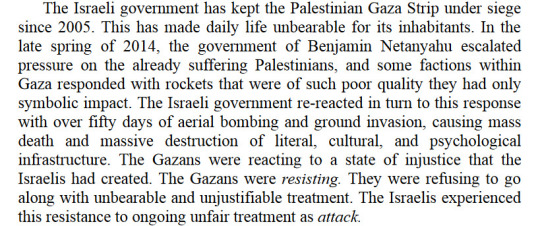
Sarah Schulman, Conflict Is Not Abuse: Overstating Harm, Community Responsibility, and the Duty of Repair (2016)
#sarah schulman#conflict is not abuse#israel#palestine#i've been thinking a lot about this section of her book recently and the way this pattern repeats#i admire her emphasis on the chronology of events and the way she keeps perspective on the material violence happening#a book that has a lot to offer people everywhere i think#my posts
3 notes
·
View notes
Text
Conflict is not Abuse (great book) and triggers are yours to manage
#triggers#ptsd#recovering codependent#codependency#tw abuse#conflict is not abuse#conflict#clarity#gaslight gatekeep girlboss
0 notes
Text
'Art should disturb the comfortable and comfort the disturbed' - one of my favourite lines ever.
a weird amount of Fandom People but internet leftists in general seem to be completely unable to separate discomfort from harm
#Conflict is not abuse#Discomfort is good actually#Helps you to cross boundaries sometimes#Discomfort isn't harm#Agreeing to disagree is a fully valid option
70K notes
·
View notes
Text
i'm trying to wrap my head around the enormous popularity of conflict is not abuse by sarah schulman. i think that there's an sympathetic pull in her adamant insistence on police abolition - especially as an american - as well as in her emphasis on solving conflicts by hearing out every side of the story and carefully deliberating the best path forward for all. as many fora for activism and political discussion on the left has for some years now suffered an epidemic of shunning unwanted perspectives & people who has been accused of abuse without actually being guilty of anything worthy of the name, perhaps part of the book's popularity is due to a collective thirst for a more understanding culture. however, what schulman advocates is not simply that, but an exaggerated version of it where simply cutting off a friendship you are no longer interested in is morally wrong and where you yelling exasperated at your partner leading them to throw a heavy object in your direction breaking your bones is the fault of both of you equally.
perhaps we collectively lack pragmatism more than anything. most conflicts can be solved empathetically and peacefully and we can allow some conflicts to be so big that social exclusion is necessary. we can acknowledge that ghosting with no prior warning is bad form and allow people to simply opt out of friendships that are no longer satisfactory.
8 notes
·
View notes
Text
me, clutching the bathroom sink, looking into the mirror, tears welling up in my eyes: conflict is not abuse conflict is not abuse conflict is not abuse conflict is not abuse conflict is not abuse conflict is not abuse conflict is not abuse conflict is not abuse conflict is not abuse conflict is not abuse
#vent#rant#relationships#conflict is not abuse#i just needed to get this off my chest#i fell for a scam and my husband was mad that I didn’t go to him about it first#but now we’ve got it mostly fixed and we’ve filed a claim#im so embarrassed that i fell for a scam like this in 2024
1 note
·
View note
Text
Reading "Conflict is not Abuse" by Sarah Schulman and I've reached part three; the discussion of the Israeli apartheid and genocide of Palestine. I highly recommend the book, it has prompted much self reflection; strange to see records of social media posts from nearly 10 years ago nearly indistinguishable from now, especially the use of Hamas as a bogeyman to justify the oppression they resist. That is the nature of this 'conflict' though; it is not some sudden new phenomenon but an ongoing genocide of 75 years.
1 note
·
View note
Text
Congo💔🕊️
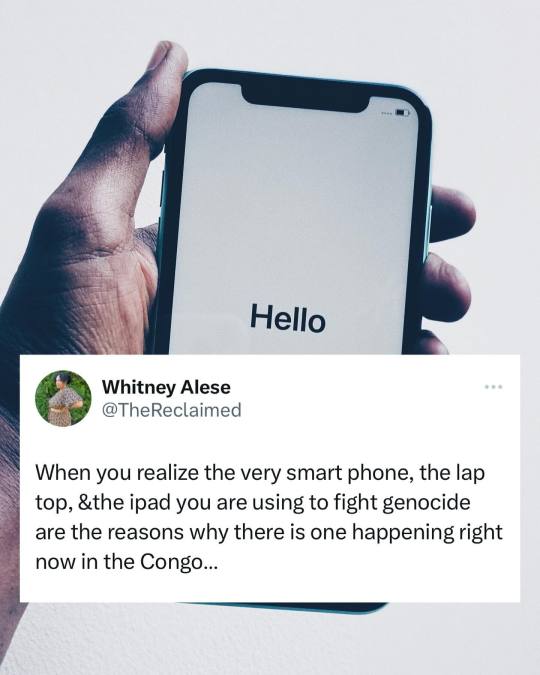
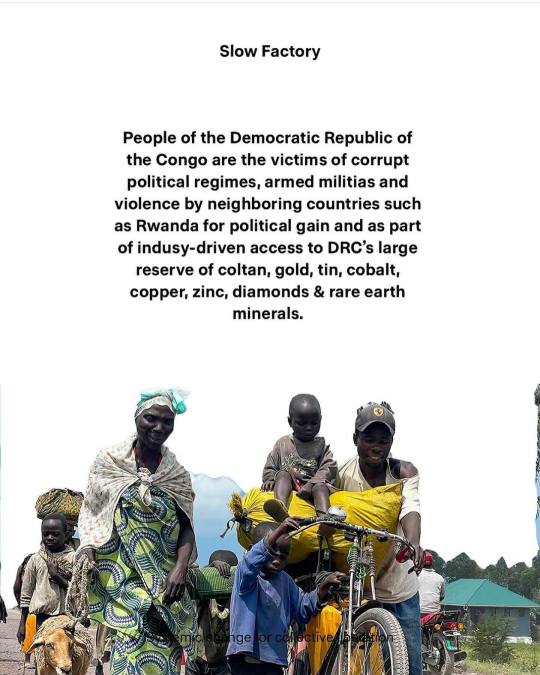
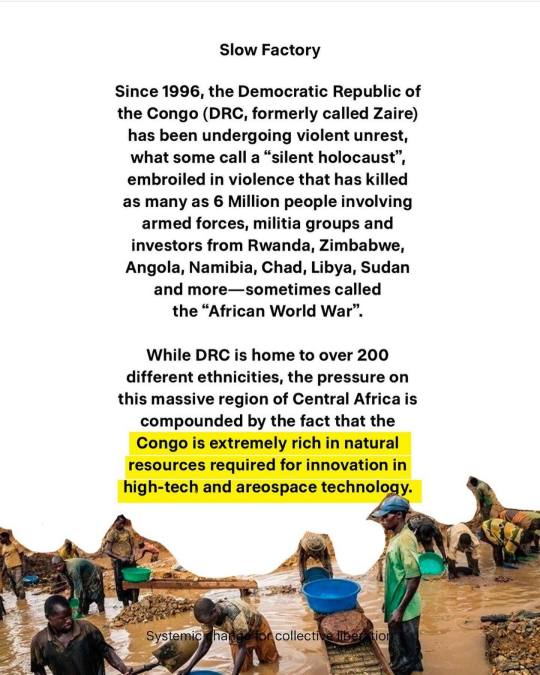
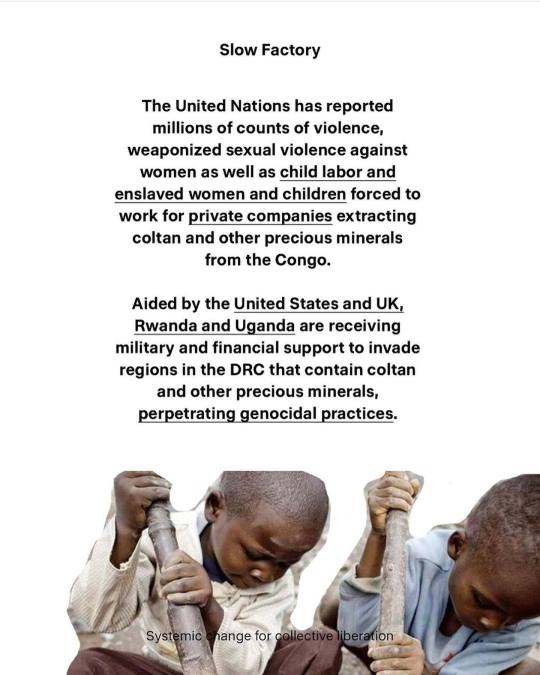
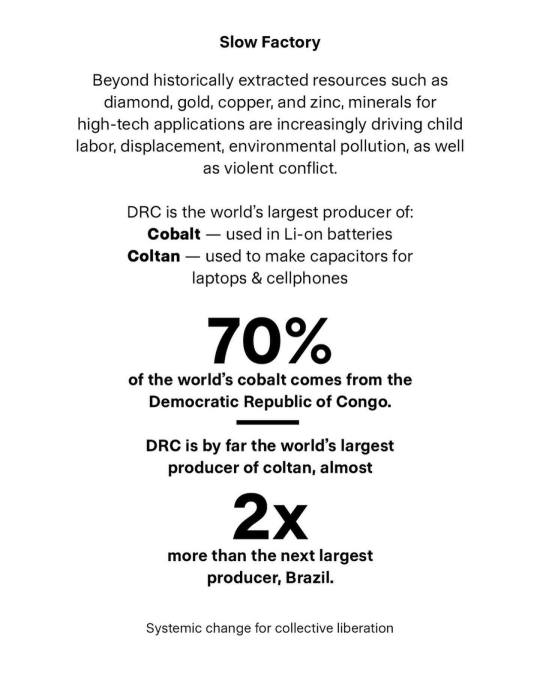
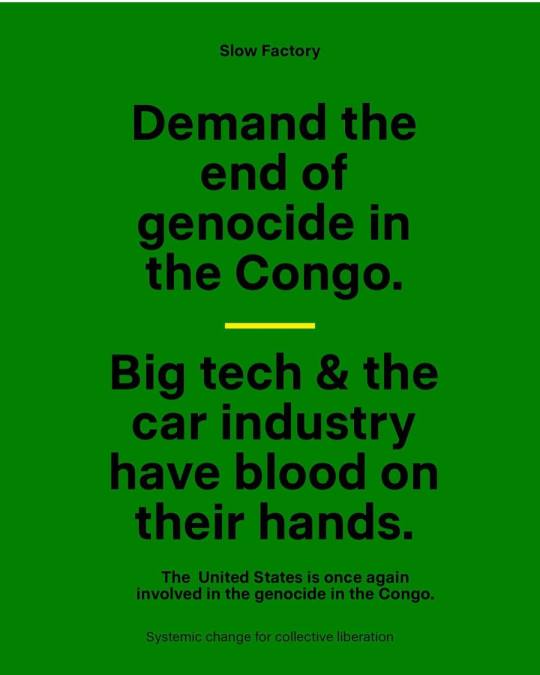
We really cannot be free until we all are free.
#Congo Genocide#Conflict Minerals#Cobalt Exploitation#Coltan Crisis#Resource Exploitation#Human Rights Abuse#Environmental Impact#Corporate Accountability#DRC#Mineral Supply Chain
14K notes
·
View notes
Text
Pssst...hey... Alfred can't be "good" if Bruce is "bad"
If Bruce is written as abusive and obsessed with "the mission," then logistically, ya gotta write Alfred as an enabler/accessory to the abuse.
It is impossible for Alfred to be there throughout all Robins, be first witness for multiple years with multiple children "suffering" and still have the kids be like: "Oh well, Alfred is still an angel, though." They would've known he hadn't helped them.
Imagine a building is on fire, and someone just stands there and watches it. They didn't start it, but they also don't try to put it out. They don't help anyone get out. They don't even bother calling for help. Yet, they still get a medal for their bravery??
There would only be 2 ways that Alfred could be seen as a "loving grandfather" if he
1. Outright stops Bruce by confronting him directly or getting the kids out from the first sign of abuse.
2. If Bruce is at least a somewhat decent father. Sure, he can make mistakes, and he can fumble sometimes. But Bruce can not be actively harmful to the kids for years without Alfred being aware and choosing to leave the kids to fend for themselves.
Alfred would have to be written as a non questions asked, 100% dedicated to only a "True Wanye" kind of butler. He would have to see the kids as not real Wayne's to allow an abusive Bruce to continuously harm them. The kids would know this and hate BOTH of them.
#i'm just saying#alfred has to have the same moral standing as bruce#otherwise both robin and batgirl wouldn't last long#bruce and alfred in conflict about something serious would prevent robin and batgirl from continuing#Bruce would have to fire Alfred in which Alfred could report him#alfred pennyworth#bruce wayne#dick grayson#barbara gordon#cassandra cain#jason todd#stephanie brown#tim drake#duke thomas#damian wayne#tw fictional child abuse#batman#robin#batman and robin#batgirl#fan fiction#fanfic#dc comics
742 notes
·
View notes